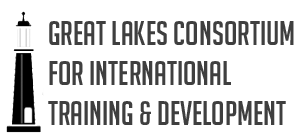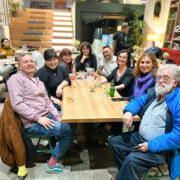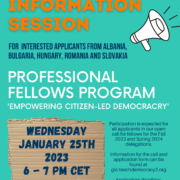Message from our alumna Milena Nikolova: “Join now. Thank me later”
Milena Nikolova, was one of the Bulgarians in our Fall 2016 delegations. Six and a half years later she looks back at her experience with the GLC Professional Fellows program and has an important message to share with everyone debating whether to join the program. The message says “Just do it. Thank me later”.

On the photo: Milena (second on the right) meets her mentor Micheal Tierney (right) years later. Sofia, November 2022.
Here Milena’s full story:
The year is 2016, Sofia, Bulgaria. I am 38, a mother of two.
Three years ago I started working again after a quite long period of time out – time of quiet contemplation and taking care of my baby boys.
I have vaguely heard about the Professional Fellows Program of the U.S. State Department. Yet I usually tend to wave it aside – oh, no, it is not for me, I am a simple, modest person, a mother of two who has been on maternity leave for ages and unfortunately has lost all her sharp observation skills and audacity she boasted in the past.
I was also thinking that my age will not allow me to qualify for the program. Yet Emil [Metodiev] somehow approached me in his nonchalant way and managed to talk me into applying. He was speaking as if everything was certain – I would go to the U.S. and would not only enormously enjoy the program but also hugely benefit from it. And he was talking about it as the only option – there was no alternative.
Initially hesitant, I gradually started thinking about the perspective of me in the U.S., living and working under the mentorship of a very experienced tutor, challenging myself, seeing and learning things I would not be able to learn here.
I had just graduated a second Master in Political and Social sciences by then and my thesis was related to the topics of migration and integration. For the purpose of its preparation, I was frequently traveling to Harmanli – a small town near the border with Turkey where the biggest refugee camp in Bulgaria is located. There I did a lot of one-on-one meetings with refugees and people from the host community, trying to find out what the obstacles, challenges and success stories of integration are.
I was volunteering with Caritas in their peer support programme – helping a young woman from Palestine – a mother of two – to learn Bulgarian and to make her own way in Bulgaria. Caritas also got me involved in children playgroups – assisting migrant and refugee children do their homework and learn Bulgarian, while giving some time out to their moms.
So naturally my pre-departure action plan was related to refugees and migrants.
Yet my professional interest by then spanned as well into juvenile justice, efficiency of social transfers, best interest of the child, and universal access to healthcare and education.
Long story short, I traveled to the U.S. as part of the professional fellows program. While boarding the plane, I still didn’t completely grasp what was going on, where I was going to and what I was going to see, hear and learn.
During the initial introductory sessions in Chicago to make us acquainted with community organizing and share its main principles and how-to, all my hesitation and scepticism faded away. I knew it was widely applicable – in my professional community, in my neighbourhood in a working class suburbia in Sofia, even in my friends’ lists.
In the U.S. I was placed in West Virginia under the mentorship of Michael Tierney. There I met a number of professionals working in various fields – early childhood development and education, juvenile justice, opioid crisis, food security, and refugees and migrants.
My co-fellow Cristina Tanase from Romania and I were exposed to so many different encounters – both personal and professional – to lots of people. I was regularly jogging by then and in Charleston I got offers from local runners to join them in their morning run along the river. I met a priest from an Orthodox church, a Bulgarian lady working and living in Charleston, and Bulgarian conductor Stiliyan Kirov, touring in Charleston with the Illinois Philharmonic Orchestra.
During my stay in the U.S., I was welcomed by incredible open-heartedness, hospitality and friendship. My new friends in Charleston made sure that I was well entertained in DC (our last week of the programme included a gathering of all professional fellows in DC) by giving me the number of friends of theirs in the capital city. I was supposed to hang out with them in DC but surprisingly they took me to a live concert of Saint Paul and the Broken Bones – a mind-blowing soul band from Alabama.
Long story short, one usually gets what she doesn’t expect and doesn’t pray for in life. I was unemployed (left my previous job in the summer of 2016) by the time I traveled to the U.S. Migration and refugee affairs were already part of my academic and professional interests but nothing tangible was within reach by then. I was thinking about a PhD (certainly on migration topic) but I also needed a job.
Elizabeth Balint from Great Lake Consortium, the lady who was in charge of the whole programme for professional fellows coming from Eastern Europe, was initially quite doubtful about my professional action plan in the U.S. She used to say that so far in the programme nobody had been successful if working on this topic.
Hold my beer!
After my wonderful experience in the States, I got back to Bulgaria and was enjoying myself for quite a while, until in early spring of 2017 I found a job in the International Organization for Migration, the UN migration agency. I remember that in February 2017 my mentor Michael Tierney was visiting me in Sofia and part of our activities included a visit to the Harmanli refugee camp.
Since then I has been working for UN in the field of migration. I was working in Sudan for a couple of months to facilitate services provided to migrants and to analyse migration routes in Darfur. I was also working in Ramstein, Germany with Afghans evacuated from their home country in August and September 2021. I am working with Ukrainians fleeing the war and seeking asylum in Bulgaria now.
Experience in the U.S. as part of Professional Fellows programme proved to be one of the most valuable professional and academic-wise. While learning a great deal not only about community organizing, civil mobilization and participation, I was also making friends for life and learning how to make my way in a completely unfamiliar environment.
If you hesitate whether to take your chance and join the programme, don’t. Join now. Just do it. Thank me later.



